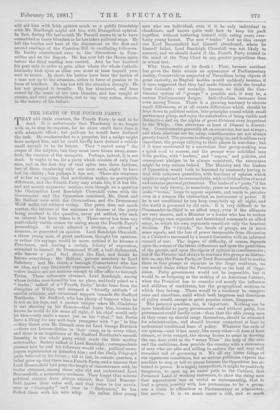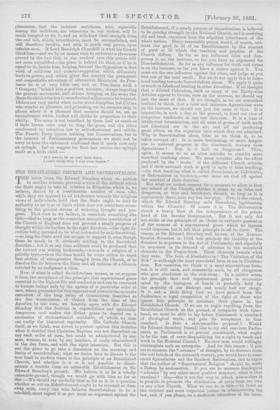THE DEATH OF THE FOURTH PARTY.
THAT odd little creature, the Fourth Party, is said to be dead. It is unfortunate that Thackeray is no longer with us, to sing its requiem, for he alone could have done it with adequate effect ; but perhaps he would have declined the task. He condescended to a porpoise, but a midge might have escaped him, and he could hardly have devised a vehicle small enough to be its hearse. They "carted away" the corpse of the dolphin, but they must have blown away, some- how, the remains of the mosquito. Perhaps, indeed, it is not dead. It ought to be, for a party which consists of only four men, and on the first day of trial splits into three factions, two of them numbering only one man each, ought to have lost its vitality ; but perhaps it has not. There are creatures of so low an organism that subdivision makes no perceptible difference, and the Fourth Party may retain life, if it has life, and not merely automatic motion, oven though on a question like Obstruction Lord Randolph Churchill votes with the Government and the Opposition combined, Mr. Gorst and Mr. Balfour vote with the Obstructives, and Sir Drummond Wolff walks out without voting. The point does not much matter, the interest of the existence or decease of the party being confined to the question, never yet settled, why such an interest has been taken in it. There never has been any particularly visible reason for caring about the Fourth Party's proceedings. It never affected a division, or altered a measure, or generated an opinion. Lord Randolph Churchill, a clever young man, of great perkiness, thought his opinions, or rather his sayings, would be more noticed if he became a Free-lance, and having a certain felicity of expression, attracted to himself Sir Drummond Wolff, a half-diplomatist, who knows a good deal about the East, and thinks he knows everything ; Mr. Balfour, private secretary to Lord Salisbury ; and Mr. Gorst, a borough Conservative who has an idea, and very frequently expresses it, namely that Conser- vative leaders are not anxious enough to offer office to borough Tories. These adherents obtained, Lord Randolph, among whose foibles over-humility has no place, suddenly posed as a "leader," talked of a "Fourth Party," broke loose from the discipline of Whips, and assumed a "friendly attitude" of candid criticism and occasional support towards Sir Stafford Northcote. Sir Stafford, who has plenty of humour when he is not on his legs, and a perfect temper when Mr. Gladstone is not showing up his finance—that hurts him, because he knows he could do his sums all right, if his chief would only let him—only made a smart jest on his "rival ;" but Tories have a liking for any well-born youngster with " go " in him —they threw over Mr. Disraeli once for Lord George Bentinck —there are Irreconeilables in their camp, as in every other, and there is an impatience of Sir Stafford Northcote's smooth finessing in the whole party which made the little mutiny noteworthy. Society talked of Lord Randolph ; correspondents guessed how he and his followers would vote ; political news- papers reprehended or defended him ; and the Daily Telegraph quite believed in his future ; till at last, in remote quarters, a belief grew up that there was a Fourth Party, and a rumour that Lord Beaconsfield had gone the length of remonstrance with its leader obtained, among those who did not understand Lord Beaconsfield, a momentary credence. They forgot that minute political coteries have always existed, that Lord Beacons- field knows their value well, and that twice in his novels, once in " Coningsby " and once in " Endymion," he has flicked them with his wire whip. He rather likes young
men who are individual, even if it be only individual in cheekiness, and knows quite well how to keep his pack together, without bothering himself with rating every over- hasty young hound. The new " leader " had no idea except one Lord Beaconsfield had himself abandoned, where he himself failed, Lord Randolph Churchill was not likely to succeed, and we should doubt if the Fourth Party existed in the mind of the Tory Chief in any greater proportions than in actual fact.
Why, then, write of its death ? First, because accident has given the little coterie an appearance of Parliamentary reality, Conservatives suspected of Parnellism being objects of great curiosity, as English beetles would suddenly become, if it were suggested that they had made friends with the invader from Colorado ; and secondly, because we think the Con- tinental system of " groups " a possible and, it may be, a serious Parliamentary danger. Individualism increases here even among Tories. There is a growing tendency to elevate small differences, or at all events differences which should be kept down in political action, into principles round which small parties may group, and enjoy the satisfaction of being visible and distinctive, and on the nights of great divisions even important to the Whips. One attraction at least of Dissent is dissent- ing. Constituencies generally sit on eccentrics, but not always ; and when elections are far away, constituencies are not always greatly feared. The process is always going on, and is seldom very important, the groups rallying to their places in war-time ; but if it were accelerated by a conviction that group-making was a quick road to success, and the groups were solidified into little parties, with "leaders," and "organs," and policies, and consequent pledgee to be always consistent, the annoyance might be very serious indeed. The Ministry and the leaders. of Opposition would both be harassed by constantly having to deal with unknown quantities, with fractions of opinion which might or might not be irreconcilable, with individualities of novel and extreme personal pretensions. The leader of a "party," if the party be only twenty, is somebody, poses as somebody, tries to make "terms," longs to appear separate, and tends to perceive even in a weapon like obstruction an instrument of power. If he is not conciliated he can keep everybody up all night, and the world is governed by old men. It is very difficult to be Commander-in-Chief in an allied army, even if the alliances are very sincere, and a Minister or a leader who has to reckon with groups once organised and formulated commands an allied army, in which his own regiments constitute only the heaviest division. His "friends," the heads of groups, are in some sense equals, and the loss of power inseparable from discussion in a Cabinet is increased by a second discussion with an informal council of war. The degree of difficulty, of course, depends upon the extent of the latent differences and upon the patriotism of the groups, and upon the vigour of opinion in constituencies ; but if the Premier had always to convince five groups as distinc- tive as, say, the Peace Party, or Lord Beaconsfield had to soothe three or four groups as separate as the Jingo residuum, no one would desire either the Premiership or the lead of Oppo- sition. Party government would not be impossible, but it would be as fatiguing as the making of an American Cabinet, when the President has to consider not merely the influence and abilities of candidates, but the geographical sections to which they belong. There would be a tendency to compro- mise and conciliate, amid which both largeness and directness of policy would, except in great popular crises, disappear.
The personal question, too, is important. Nothing can be more beneficial to party government—and without party, free government could hardly exist—than that the able young men as they come up should range themselves, should be educated for administration, and should become competent at least to understand traditional lines of policy. Whatever the evils of our system—and it has many, like every other—it does at least attract, or even compel, the strong horses to assist in drawing the car, does yield to the "weary Titan" the help of the able and the ambitious, does provide the country with a succession of men who are able and willing to endure the not very well rewarded toil of governing it. We all say . bitter things of our opponents sometimes, but no serious politician expects the machine to stop or fall to pieces because the Opposition has at-. tamed to power. It is highly inexpedient, it might be positively dangerous, to open up an easier path to the Cabinet, that Promised Land of working statesmen, to show the rising men that separateness was as useful as statesmanship, that to lead a group, possibly with few pretensions to be a group, was a claim as efficacious as Parliamentary or administra- tive service. It is so much easier a role, and so =oh pleasanter, that the indolent ambitious, who, especially among the well-born, are numerous in our system, will be much tempted to try it, and so withdraw their strength from the real toil, which, nevertheless, must be accomplished, and will therefore devolve, and with it much real power, upon inferior men. If Lord Randolph Churchill is what his friends think him—and we by no means wish to underrate a cleverness proved by the fact that in our readers' eyes this article will not seem unjustified—his place is behind his chief, or if he is equal to it, beside him, helping forward the Opposition in that work of criticism and counter-suggestion which ultimately leads to power, and which gives the country the permanent and unspeakable advantage of alternative Ministries. As Free- lance he is of very little use, and as Free-lance with a "Company "behind him a positive nuisance, always impeding the general movement, and always bringing on the army the discredit which attaches to unauthorised sallies su re to be defeated. Uhlans are very useful when under strict discipline, but Uhlans who wander at pleasure, and go looking out for enemies only in places where it is pleasant that enemies should be, are an encumbrance which leaders will dislike in proportion to their ability. The army is not benefited by them half as much as if their horses were sent to drag the guns, and the riders condemned by relentless law to self-effacement and utility. The Fourth Party injures nothing but Conservatism, but in the interest of Parliamentary government we shall not be sorry to hear the statement. confirmed that it needs now only an epitaph. Let us suggest for that last service the epitaph made on a little child •:— " If I was to be so very ROOD done,
I can't think why I was over begun."



































 Previous page
Previous page